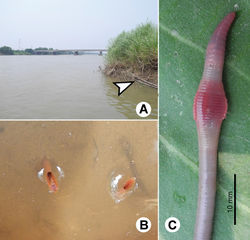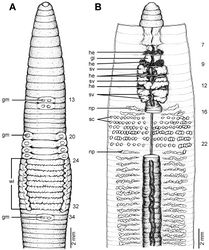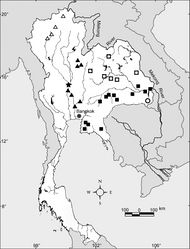Glyphidrilus chaophraya
| Notice: | This page is derived from the original publication listed below, whose author(s) should always be credited. Further contributors may edit and improve the content of this page and, consequently, need to be credited as well (see page history). Any assessment of factual correctness requires a careful review of the original article as well as of subsequent contributions.
If you are uncertain whether your planned contribution is correct or not, we suggest that you use the associated discussion page instead of editing the page directly. This page should be cited as follows (rationale):
Citation formats to copy and paste
BibTeX: @article{Chanabun2013ZooKeys265, RIS/ Endnote: TY - JOUR Wikipedia/ Citizendium: <ref name="Chanabun2013ZooKeys265">{{Citation See also the citation download page at the journal. |
Ordo: Oligochaeta
Familia: Almidae
Genus: Glyphidrilus
Name
Glyphidrilus chaophraya Chanabun & Panha sp. n. – Wikispecies link – ZooBank link – Pensoft Profile
Type material
Holotype: One adult CUMZ 3283 (Fig. 24),in a bank of the Chaophraya River, Payuhakiri, Nakhonsawan, Thailand, 15°25'24.2"N, 100°08'12.0"E, 31 m amsl, 27 March 2012. Paratypes: 28 adults and 41 juveniles (CUMZ 3284), 3 adults (ZMH 14577), and 3 adults (NHM), same collection data as holotype.
Etymology
This new species was named after the Chaophraya River, which is a famous and important river in central Thailand. This is the first time Glyphidrilus has been recorded from this river.
Diagnosis
The unique characters of Glyphidrilus chaophraya sp. n. consist of distinct expanded tissues of clitellar wi in 24, 25–32, 33, with clitellum in 20–43, 44, 45; gm: median paired on aa in 12, 13, 14 and 34, 35, 37, 38, lateral paired or asymmetrical on bc in 16, 19, 20–23 and 32, 33; sv in 9–12; he in 7–11; intestinal origin in 15; ov in 13–14; sc in 16/17–22/23 (Table 1).
Description of Holotype
Dimensions: body length 116 mm, diameter 2.7 mm in segment 8, 4.4 mm before the clitellar wi in segment 23, 3.9 mm after wi in segment 33 in clitellar region; body cylindrical in anterior part, quadrangular in transverse section behind clitellum. 325 segments. Body colour pale brown with variations from red to pink at adjacent tissues of wi portion in different individuals of newly collected specimens. At posterior end dorsal surface considerably broader than the ventral. Clitellar wi on ventro-lateral part of clitellum in 24–32, 4.6 mm in height, and about 0.6 mm in width on both sides. Prostomium zygolobous. Dorsal pores absent. Clitellum annular in 20–43. Four pairs of setae per segment from 2, setal formula aa:ab:bc:cd:dd = 1.6:0.6:1.2:0.6:2.4 in segment 8 and 1.6:0.5:1.2:0.5:2.1 in postclitellar segments. Female pores, male pores and spermathecal pores not visible. Gm: laterally paired or asymmetrical on bc in 20–23 and median paired on aa in 13, 14 and 34.
Septa 5/6–7/8 thicker, 8/9–10/11 thick and 11/12 to the last segment thin. Small globular gi within 8. Intestine enlarged from 15. Dorsal blood vessel anterior to 7. He in 7–11. No distinguishable np in first fourteen segments. Sv in 9–12, pair in segment 12 larger than the others. Ov in 13–14. Prostate and accessory glands absent. Sc in 16/17–22/23, about 0.1–0.3 mm in diameter, one to thirteen on each side per segment.
Variation
Body length of adult paratyps (34) ranged between 113–138 mm (124.3 ± 17.7), with 325–414 segments. Wi in 24, 25–32, 33, with clitellum in 20–43, 44, 45; gm: median paired on aa in 12, 13, 14 and 34, 35, 37, 38, lateral paired or asymmetrical on bc in 16, 19, 20–23 and 32, 33.
Distribution
The new species is known from the type locality in the river banks of Chaophraya River, Payuhakiri, Nakhonsawan, Thailand. This species was found on the shore but in proximity to the river water, in the loamy sand topsoil (88.2% sand, 10.2% silt, 1.6% clay, pH 7.5–7.6) and also under the water at about 20–30 cm depth. The soil surface was covered with worm casts near the river banks.
Remarks
Glyphidrilus chaophraya sp. n. differs from Glyphidrilus weberi by Glyphidrilus weberi has wi in 22, 23–½32, 32, shorter clitellum in 16–32, intestinal origin in 13, and sc in 13/14–17/18. It differs from Glyphidrilus birmanicus in that Glyphidrilus birmanicus has different locations of wi in 21, 22, 23–28, 29, 30, with longer clitellum in 12, 13–43, 44, intestinal origin in 15, and sc in 13/14–17/18. It differs from Glyphidrilus yunnanensis by Glyphidrilus yunnanensis has longer wi in 22–32, shorter clitellum in 18–38, intestinal origin in 16, and lacks sc. It differs from Glyphidrilus vangviengensis by Glyphidrilus vangviengensis having shorter clitellum in 19, 20–35, 36, 37, intestinal origin in 16, and lacks sc. Differs from Glyphidrilus mekongensis by Glyphidrilus mekongensis has longer wi in 24–½33, 33, 34, ½35, shorter clitellum in 19–37, 38, and lacks sc.
The new species differs from Glyphidrilus chiensis sp. n. (see below) in that Glyphidrilus chiensis sp. n. has shorter clitellum in 17, 18–33, 34, 35, 36, 37, 38, and sc in 12/13–18/19. Differs from Glyphidrilus quadratus sp. n. by Glyphidrilus quadratus sp. n. has shorter clitellum in 15, 16, 17, 18–31, 32, 33, 34, 35, 36, and sc in 12/13–17/18. Differs from Glyphidrilus huailuangensis sp. n. by the following characters: Glyphidrilus huailuangensis sp. n. has shorter clitellum in 12, 13, 16–32, 33, intestinal origin in 13, np from 13, and lacks sc (Table 1).
Original Description
- Chanabun, R; Sutcharit, C; Tongkerd, P; Panha, S; 2013: The semi-aquatic freshwater earthworms of the genus Glyphidrilus Horst, 1889 from Thailand (Oligochaeta, Almidae) with re-descriptions of several species ZooKeys, 265: 1-76. doi
Images
|


